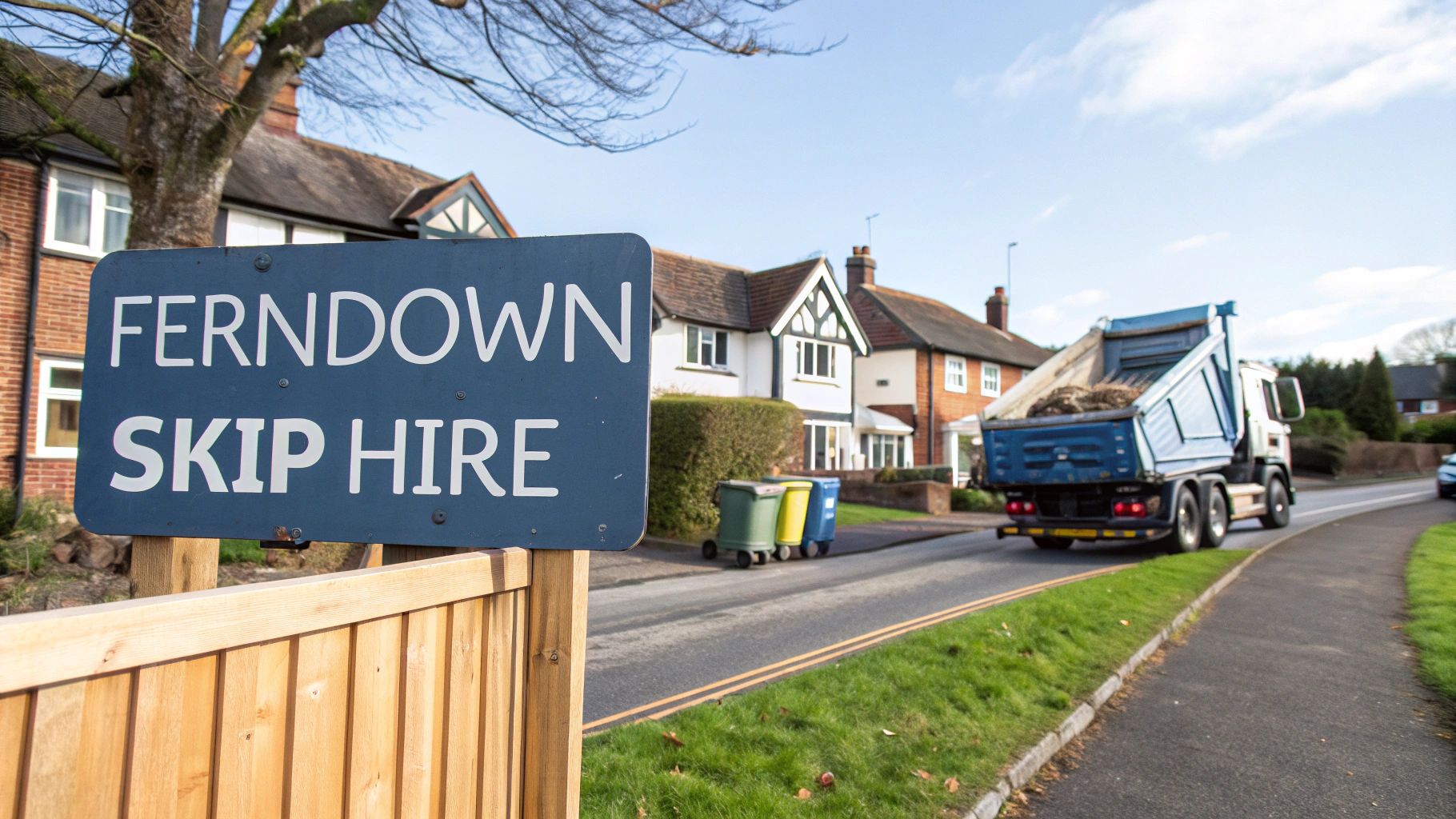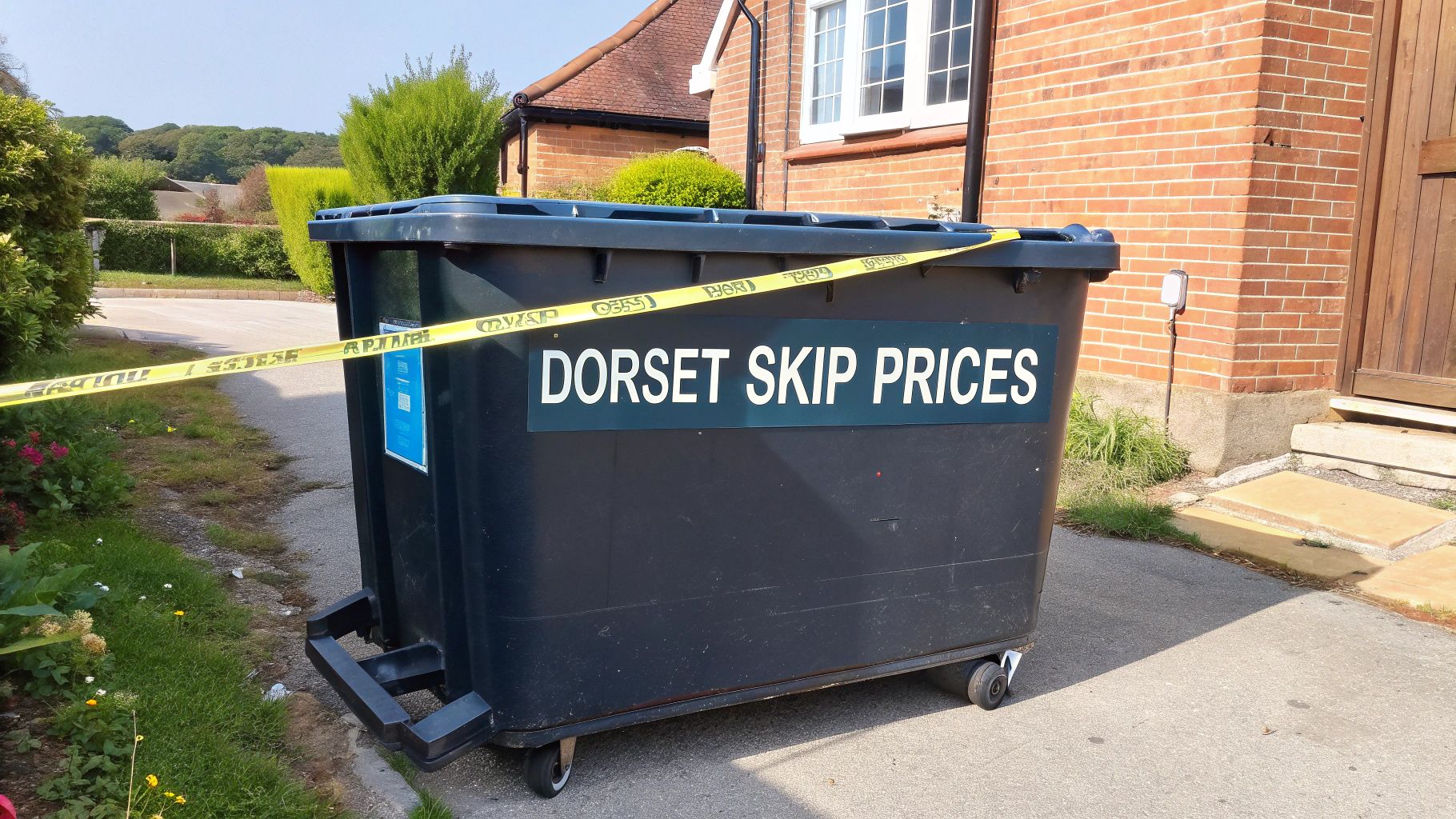Reduce Commercial Waste Disposal Costs | Essential Tips
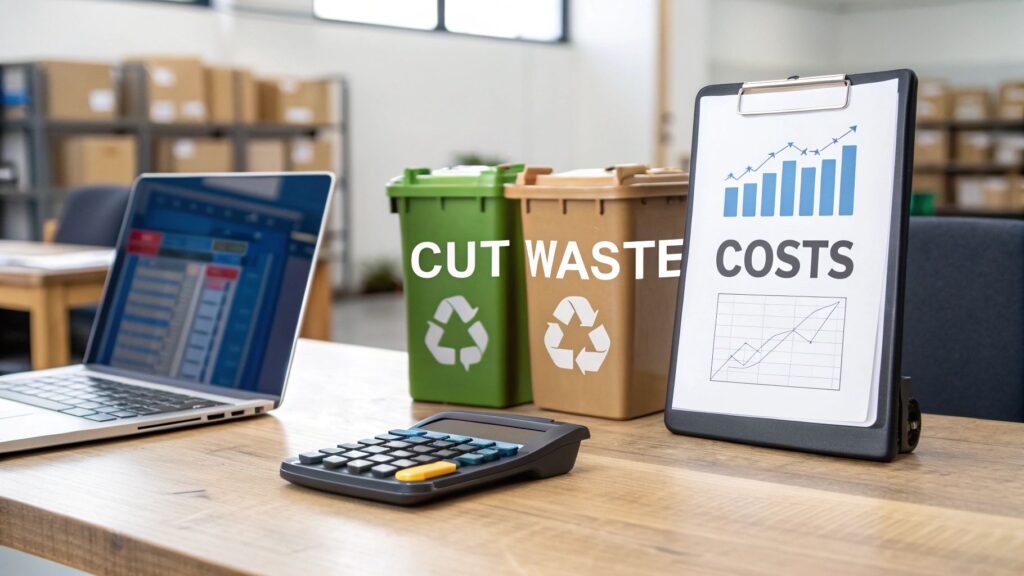
The cost of getting rid of your commercial waste in the UK can be anything from completely free for certain recyclables, all the way up to £250 per tonne for general waste. The final bill really comes down to what you're throwing out, how much it weighs, and what your collection company charges – but there are huge savings to be had if you get your recycling sorted.
Decoding Your Commercial Waste Disposal Costs
Trying to understand your commercial waste bill can feel a bit like looking at your mobile phone contract. You see one price advertised, but once they add on the line rental, data charges, insurance, and all the other little extras, the final number is a lot higher. It’s the same story with your waste invoice; the "price per lift" is just one piece of a much bigger puzzle.
To get a real grip on your spending, you need to look past the collection fee. Think about the disposal gate fees, landfill taxes, and even the admin charges for all that compliance paperwork. The moment you start treating waste management as a strategic part of your budget, rather than just another job to get done, is the moment you can start taking back control.
A Snapshot of UK Disposal Costs
When you see the typical prices for different types of waste, you quickly realise there’s a massive financial incentive to get your sorting right. It’s simple: the less you sort, the more you pay. Mixed general waste is always the most expensive thing to get rid of.
On the flip side, clean, well-sorted recyclables often have very low disposal costs, and sometimes they’re even free. This isn’t an accident. The pricing is set up to encourage businesses like yours to be more sustainable.
The core principle is straightforward: The more effort you put into separating your waste, the less work your disposal company has to do, and the lower your commercial waste disposal costs will be. It’s a direct reward for being environmentally responsible.
Looking ahead to 2025, the typical disposal costs really show this difference. Getting rid of general business waste can set you back anywhere between £170 and £250 per tonne, mostly because of landfill tax and processing fees.
Compare that to recycling, which is much kinder to your wallet. Clean plastic recycling can be free or cost up to £70 per tonne, while paper, cardboard, and glass are often free or up to £55 per tonne. Even commercial food waste, at £50 to £180 per tonne, is a cheaper option than sending it to landfill. If you want to dig deeper into the numbers, you can learn more about how UK collection costs are calculated.
The data makes it crystal clear: the best way to cut your costs is to divert as much as you can away from the general waste bin and into the right recycling streams.
Quick Guide to UK Commercial Waste Disposal Costs Per Tonne
Here’s a simple table to give you a quick idea of the average costs for different waste types. It really highlights how much you can save by separating your recyclables from your general waste.
| Waste Type | Average Cost Range (Per Tonne) |
|---|---|
| General Business Waste | £170 – £250 |
| Commercial Food Waste | £50 – £180 |
| Uncontaminated Plastic | £0 – £70 |
| Paper & Cardboard | £0 – £55 |
| Glass | £0 – £55 |
As you can see, the financial argument for effective waste segregation is compelling. The more you recycle, the less you spend – it's a win for your bottom line and for the environment.
Why Are Your Business Waste Costs Going Up?
If you've noticed your commercial waste disposal bills creeping up, you're definitely not alone. It’s frustrating when costs rise without a clear explanation, but I can tell you these increases aren't random. They’re the result of a complicated mix of new rules, economic shifts, and the day-to-day realities of running a waste collection business in the UK today.
Think of it like a pyramid of costs. The base is built from government policies and taxes, all designed to push us towards more sustainable ways of handling waste. Layered on top of that are the rising operational expenses that companies like ours face every day—everything from the fuel for our lorries to the wages we pay our staff. Getting your head around these layers is the first step to staying ahead of future changes and fine-tuning your own waste strategy.
This breakdown shows the main things pushing up commercial waste disposal costs for UK businesses.
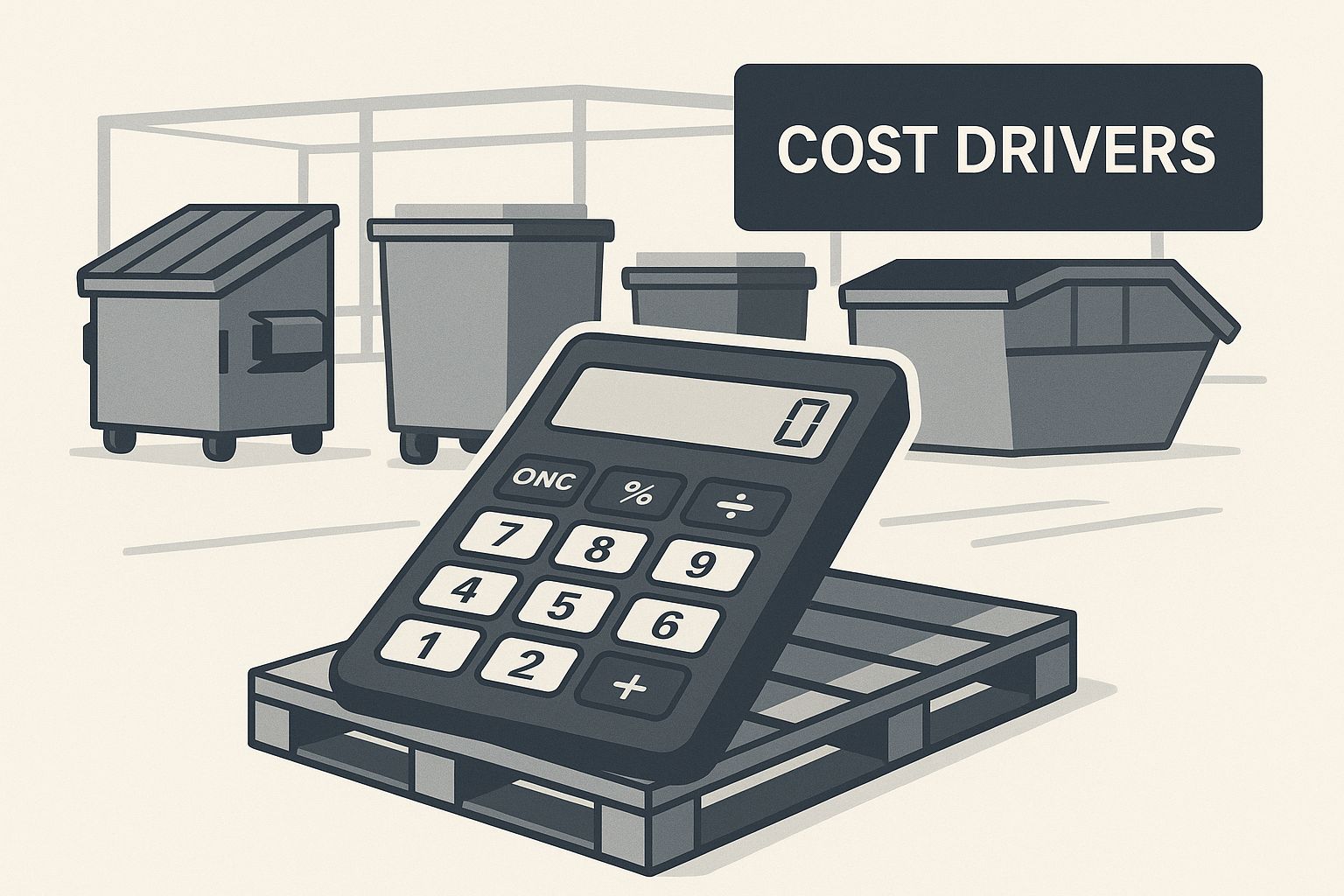
As you can see, it's a combination of new laws and direct operational costs creating something of a perfect storm for prices across the board.
The Impact of Government Regulations
A big chunk of the rising costs comes directly from new and updated government legislation. The main goal here is to improve the UK's environmental track record by creating a strong financial reason for businesses like yours to reduce, reuse, and recycle.
Here are the key regulations making an impact:
- Landfill Tax: This isn't new, but it's a major factor. It’s a tax on every bit of waste sent to landfill, and the standard rate goes up every year. This makes landfill an increasingly expensive option and has a direct effect on your commercial waste disposal costs.
- Emissions Trading Scheme (ETS): This scheme was recently expanded to include energy-from-waste and incineration plants. It means operators now have to buy permits for the carbon they produce. Naturally, these new costs are passed on to the businesses using these facilities.
- Extended Producer Responsibility (EPR): This policy makes the people who produce packaging financially responsible for its disposal, shifting the burden away from local councils. While it targets manufacturers, these costs tend to ripple down the supply chain to every business.
Put simply, these regulations are designed to make unsustainable waste habits hurt financially, nudging everyone towards greener—and often cheaper—alternatives.
Rising Operational and Market Pressures
On top of all the policy changes, waste management providers are grappling with the same economic headaches as any other business. These operational costs are a huge factor in the prices you pay for your collections.
For instance, the government's removal of tax relief on red diesel has massively increased fuel costs for running our collection lorries and the heavy machinery at recycling plants. Add the general rise in energy prices needed to power these facilities and increasing staff wages, and you can see why service fees have to go up.
The reality is that waste disposal costs for UK businesses are rising sharply, driven by a perfect storm of regulatory, operational, and market factors. Avoiding landfill and maximising recycling are now the most critical strategies for cost containment.
When you combine new green regulations with soaring operational expenses, it becomes clear that commercial waste services simply have to charge more. To get a handle on these increases, businesses are strongly encouraged to get better at recycling, improve how they separate their waste, and ultimately, produce less of it in the first place. This approach not only helps control your spending but also keeps you compliant with ever-tightening environmental standards. For a closer look at what's coming, you can explore insights into rising 2025 business waste costs.
By understanding both the government's agenda and the real-world challenges on the ground, you can see exactly why your bills are going up. This knowledge gives you the power to stop just paying the invoice and start actively managing your waste as a controllable business expense.
The Key Variables That Shape Your Waste Bill
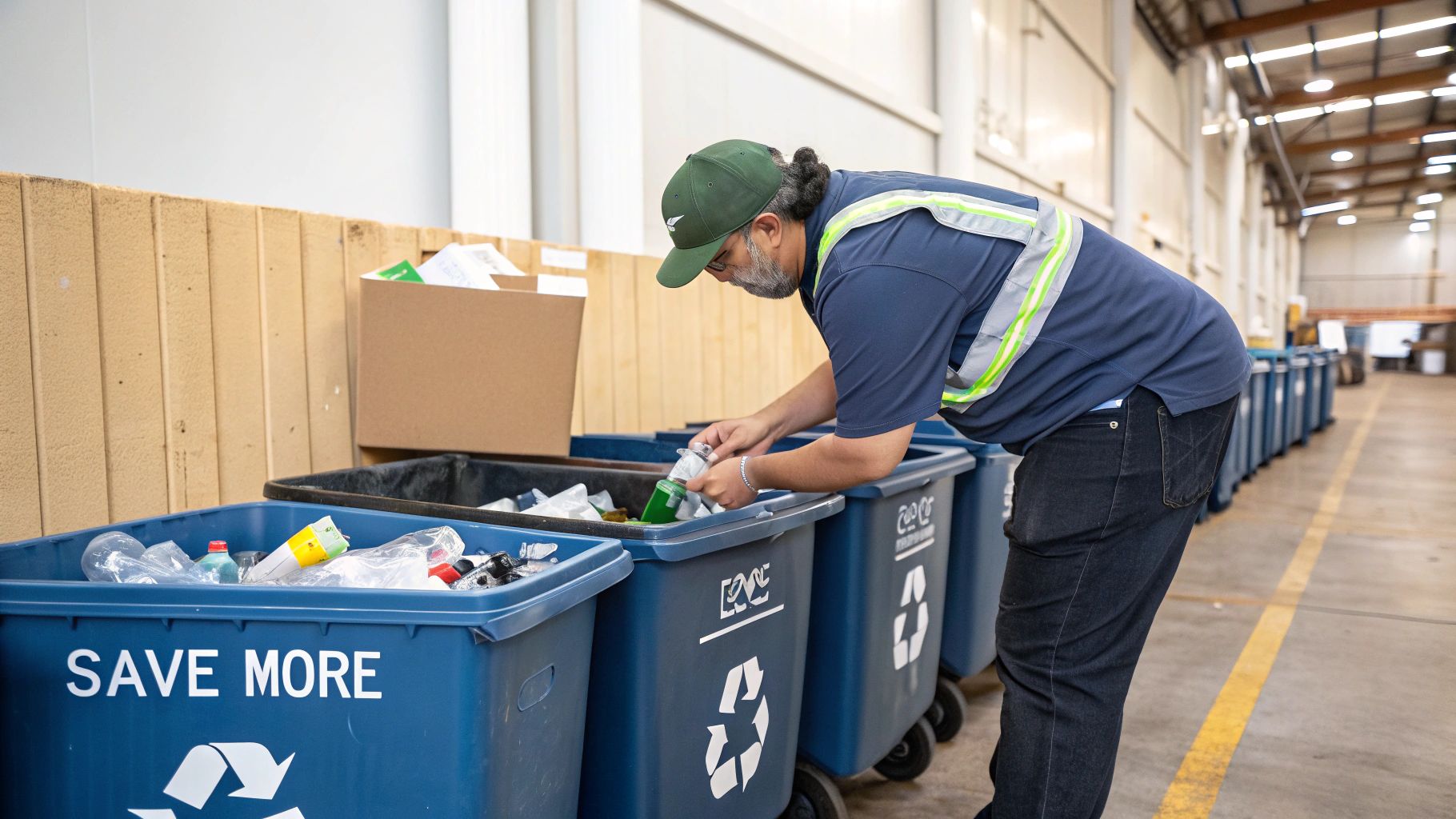
Your commercial waste bill isn't some fixed, one-size-fits-all charge plucked out of thin air. Instead, think of it as a calculation that’s completely personalised to the unique details of how your business operates. Getting to grips with the variables that influence this final figure is the first step in turning your waste management from a frustrating overhead into a controllable expense.
It's a lot like your business's utility bill. Your electricity cost isn’t random; it directly reflects how many lights you leave on and what equipment you’re running. In the same way, your commercial waste disposal costs are tied to a handful of critical factors. Once you pinpoint what’s driving your spending, you can start making smarter decisions that genuinely impact your bottom line.
Let's break down the five main variables that shape the final number on your waste invoice. Each one is an opportunity to tweak your strategy and hunt down potential savings.
The Type of Waste You Produce
The single biggest factor dictating your bill is the type of waste your business generates. Different materials come with vastly different disposal costs, mostly driven by landfill taxes and how complex they are to process. It’s like sorting your weekly shopping; it’s far easier to put away pre-sorted groceries than to deal with everything jumbled into one trolley.
Waste providers face a similar challenge. Well-sorted, clean recyclables are simpler to process and have a higher market value, which translates into lower disposal fees for you.
-
General Waste: This is your most expensive category, hands down. It’s a mix of non-recyclable materials that usually heads to a landfill or an energy-from-waste facility, both of which are hit with heavy taxes and environmental fees.
-
Recyclables: Materials like clean paper, cardboard, glass, and certain plastics are far cheaper to handle. In many cases, the disposal cost for these streams can be very low, or sometimes even free.
-
Hazardous Waste: Things like chemicals, batteries, or asbestos need specialised handling and disposal procedures due to the health and environmental risks they pose. This makes them significantly more expensive to manage.
A central London restaurant dealing with heavy food waste will have a completely different cost profile from a rural office that mainly produces paper and cardboard. Identifying your main waste streams is absolutely essential.
Waste Volume and Weight
The next crucial piece of the puzzle is the sheer amount of waste you're creating. This is measured in both volume (how much space it takes up) and weight. Waste collection contracts are often structured around the size of your bins and how heavy they are when they’re picked up.
Imagine you're posting a parcel. The price depends on both the size of the box and how much it weighs. Your waste is no different. A large but light bin full of plastic packaging will cost less to dispose of than a smaller, heavier bin filled with dense food waste or construction debris.
Your goal should be to reduce both volume and weight wherever you can. Compacting materials like cardboard can dramatically slash your volume, potentially letting you use smaller bins or cut back on collection frequency.
This is exactly why businesses that generate high volumes of waste, like retail stores or manufacturing plants, often need larger containers and face higher base costs. Accurately assessing your output helps you "right-size" your service and stop paying for bin capacity you aren't even using.
Frequency of Collection
How often your bins are emptied plays a direct role in your service fees. Every single collection involves labour, fuel, and vehicle running costs, so more frequent pickups will naturally lead to a higher bill.
A busy city-centre café might need daily collections to manage food waste and keep things hygienic, pushing up its operational costs. On the other hand, a small professional services firm might only need a weekly collection for its general waste and a fortnightly one for its recycling.
By optimising your collection schedule based on what you actually produce, you can make some serious savings. If your bins are consistently only half-full on collection day, you’re almost certainly paying for more pickups than you really need.
Finally, your geographical location and choice of provider are the last key cost drivers. Urban businesses might get more competitive pricing because they’re closer to disposal facilities, whereas remote sites often face higher transport fees. Who you partner with also matters, as service levels, contract terms, and pricing can vary wildly between providers.
Proven Strategies to Lower Your Disposal Costs
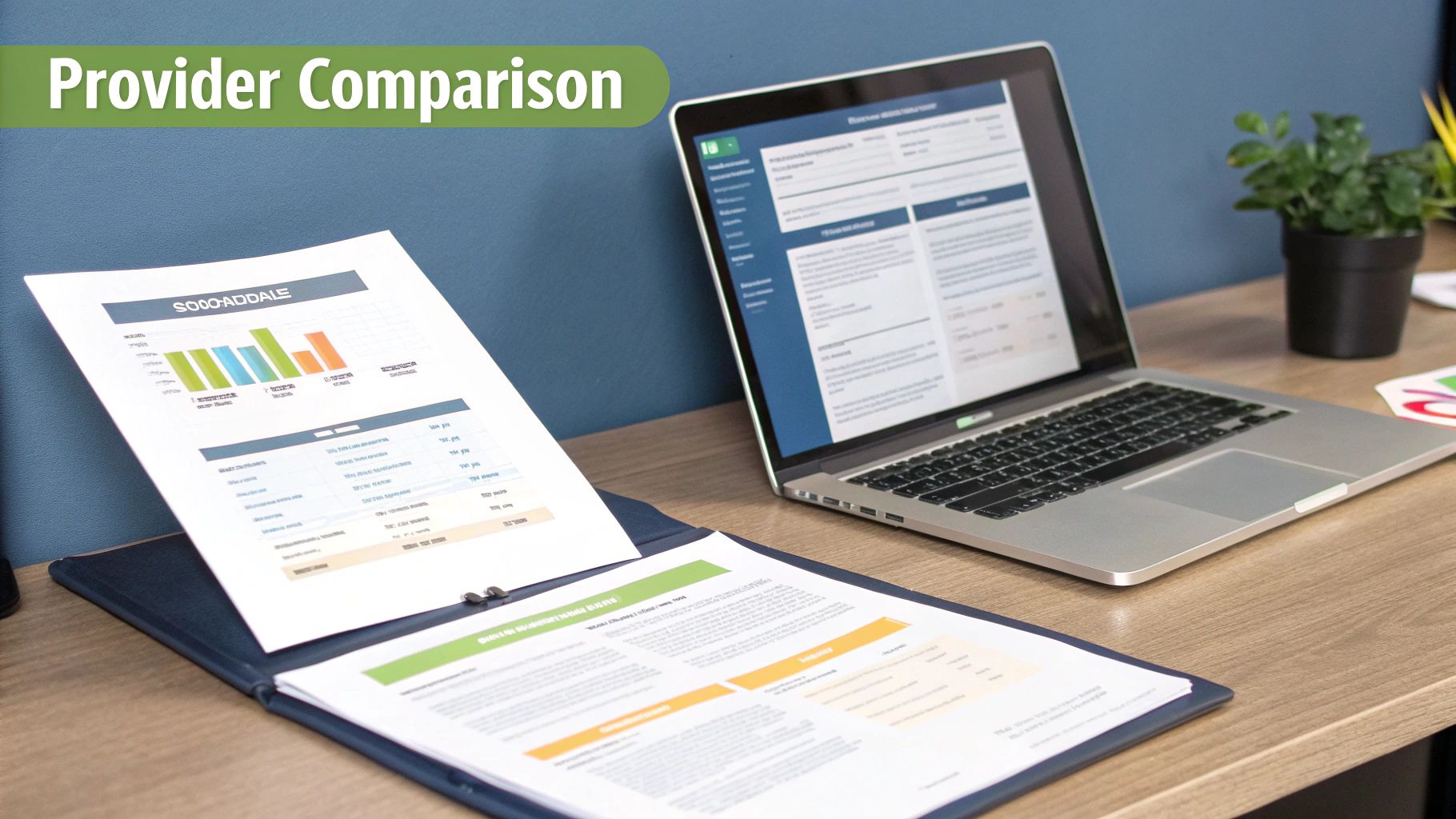
Now that you know what shapes your bill, it’s time to take control. Slashing your commercial waste disposal costs doesn't mean you have to completely overhaul your business. It's really about making a series of smart, targeted changes that add up to big savings.
Think of it like tuning up an engine. Small, precise adjustments can lead to massive improvements in efficiency and performance. This is your playbook for turning those ideas into action. We’ll walk through practical, real-world tactics that get measurable results, helping you cut costs while also boosting your business’s green credentials.
Start with a Simple Waste Audit
You can't fix a problem until you properly understand it. A waste audit is your essential first step, giving you a crystal-clear snapshot of what you're throwing away, where it’s coming from, and how much of it could be saved from the expensive general waste stream.
You don’t need a complex scientific process to get started. Just have a look in your bins right before collection day. Are your recycling bins full of food waste? Are your general waste bins stuffed with perfectly good cardboard boxes that haven't been flattened? This simple act of observation gives you immediate, actionable insights.
A proper audit shines a light on these hidden opportunities. It’s the difference between guessing where your money is going and knowing for sure, letting you focus your efforts where they’ll have the biggest impact.
Implement a Foolproof Segregation System
Proper waste segregation is the single most powerful tool you have for bringing down your costs. When materials are sorted correctly right at the source, they can be sent for recycling—which is significantly cheaper than sending them to landfill. Contamination is the number one enemy of cost-effective waste management.
The secret to success? Make it dead simple for your staff. A colour-coded bin system is a classic for a reason: it’s intuitive and gets rid of all the guesswork.
- Blue Bins: Usually for paper and cardboard.
- Green Bins: Often set aside for glass bottles and jars.
- Red or Brown Bins: Typically reserved for plastics and cans.
- Black Bins: Exclusively for non-recyclable general waste.
Clear, simple signs with pictures are also a game-changer. By making the right choice the easiest choice, you’ll see your recycling rates shoot up and the volume of pricey general waste plummet. You can find more inspiration by exploring the various sustainable waste management strategies that businesses across the UK are putting into practice.
Train Your Team and Get Them On Board
Your staff are on the front line of your waste management efforts. Without their buy-in and understanding, even the best system in the world is doomed to fail. A short, engaging training session can make all the difference.
Explain why these changes matter—not just for the planet, but for the company's bottom line. When employees understand that reducing waste helps secure the business’s financial health, they are far more likely to get on board.
A well-informed team is your greatest asset in cost reduction. Simple changes in daily habits, when adopted by everyone, compound into substantial savings over time. It’s about building a culture of resourcefulness.
Keep the conversation going. Celebrate successes, offer gentle reminders when mistakes happen, and keep waste reduction visible on team notice boards. This approach turns it from a one-off task into an ingrained part of your company culture.
Optimise Your Bins and Collections
Finally, take a hard look at the logistics of your service. Are you paying for bin space you don't use or for collections that aren't necessary? "Right-sizing" your service is a quick and easy win.
If your bins are consistently half-empty on collection day, you're almost certainly paying too much. Have a chat with your waste provider about reducing your collection frequency or swapping to smaller bins. On the flip side, if your bins are always overflowing, you risk being hit with extra charges for excess waste.
Another powerful move is to use compactors or balers for materials like cardboard and plastic. These machines squash waste down dramatically, meaning you can fit much more into a single bin. This directly translates to fewer collections and lower transport fees, directly cutting your commercial waste disposal costs.
Thinking beyond just operational tweaks, grant opportunities can offer some serious financial help. For example, there are resources available that explain how to pursue funding through programmes like the available grants for waste prevention. These can help pay for new equipment like balers or upgraded recycling facilities.
Cost-Saving Waste Strategy Comparison
Deciding which strategy to tackle first can feel overwhelming. This table breaks down a few common approaches to give you a clearer idea of where to start based on your business's needs.
| Strategy | Implementation Effort | Potential Cost Savings | Best Suited For |
|---|---|---|---|
| Basic Waste Audit | Low | Moderate | Any business new to waste management. |
| Colour-Coded Bins | Low to Moderate | High | Offices, retail, and hospitality venues with diverse waste streams. |
| Staff Training | Moderate | High | Businesses with a larger workforce where consistency is key. |
| Service Right-Sizing | Low | Moderate to High | Companies with fluctuating waste output or long-term contracts. |
| Compactor/Baler Use | High | Very High | Businesses generating large volumes of cardboard or plastic, like warehouses. |
Ultimately, a combination of these tactics will deliver the best results. Start small, track your progress, and build from there.
Choosing a Waste Partner to Optimise Your Costs
Picking a waste management company is about so much more than just finding someone to empty your bins. The right partner becomes a strategic part of your team, helping you navigate the maze of waste legislation and unlocking some serious savings. They can turn waste management from a nagging operational headache into a smooth, cost-effective system.
Think of it like choosing between a basic bookkeeper and a chartered accountant. One just records what you’ve spent, but the other gives you expert advice to improve your company’s financial health. A professional waste partner does the exact same thing for your waste streams, delivering a solid return on your investment through better efficiency, guaranteed compliance, and total peace of mind.
Moving Beyond Simple Bin Collections
A truly valuable waste partner brings expertise that goes way beyond just the logistics of collection. Their main goal is actually to help you spend less by getting smarter about how you manage waste right from the source. This means a much deeper level of service.
This more strategic approach focuses on three key areas:
- Comprehensive Waste Audits: An expert will start by digging into your waste stream to figure out exactly what you’re throwing away and where the biggest opportunities for savings are hiding.
- Compliance and Regulation: They make sure you’re fully compliant with all the complex UK regulations, helping you dodge the hefty fines that come with improper disposal.
- Optimised Service Schedules: They’ll work with you to "right-size" your service. This means your collection frequency and bin sizes will perfectly match what you actually need, cutting out unnecessary costs.
By zeroing in on these areas, they help fine-tune your operations, which has a direct and positive impact on your commercial waste disposal costs.
A Partnership in Action
Let's look at a real-world example. A medium-sized manufacturing firm in Dorset was battling ever-increasing waste bills. Their general waste bins were constantly overflowing with a mix of cardboard, plastic wrapping, and offcuts, which led to expensive excess weight charges and collections that were far too frequent.
They brought in a waste specialist who kicked things off with a detailed site audit. It quickly became clear that over 60% of what they were calling "general waste" was actually clean, dry recyclable material. The problem wasn't how much waste they produced, but the total lack of proper segregation on the factory floor.
The solution was simple but incredibly effective. The waste partner introduced a colour-coded bin system at key points along the production line and held a quick training session for the staff. Within a few weeks, the amount of rubbish going into the general waste skips had plummeted.
By diverting the majority of their waste into much cheaper recycling streams, the firm cut its collection frequency in half and switched to smaller general waste containers. This one change saved them thousands of pounds every year.
This story really gets to the heart of what a strategic partnership is all about. It’s not just about picking up rubbish; it’s about providing the expertise and tools you need to produce less costly waste in the first place.
The Long-Term Value of Expert Guidance
Ultimately, choosing the right waste partner is an investment in your business’s efficiency and sustainability. An expert provider helps you make smarter decisions that are good for your budget and for the environment. They’ll keep you in the loop about legislative changes that could impact your costs and are always on the lookout for new ways to improve your processes.
This proactive support is what delivers real long-term savings. As regulations get tighter and disposal costs continue to climb, having an expert on your side ensures you stay ahead of the curve. Many businesses are now aiming high, and a knowledgeable partner can provide a clear roadmap for how your business can achieve zero waste to landfill, a strategy that dramatically cuts costs. This kind of collaborative approach turns a necessary expense into a real competitive advantage.
Frequently Asked Questions About Waste Costs
When you're trying to get a handle on your business's outgoings, the world of commercial waste disposal can feel a bit murky. Even with a plan in place, questions about invoices, contract details, and whether you're really getting a good deal are bound to pop up.
We get it. That's why we've put together some straightforward answers to the questions we hear most often from UK businesses. Let's clear up some of that confusion.
How Can I Check If I Am Paying Too Much?
Wondering if you're getting overcharged? The quickest way to find out is to do a simple spot-check of your bins. Just before your next collection, have a peek inside. If your general waste bin is full of cardboard, plastic bottles, or other recyclables, you're almost certainly paying more than you need to.
Another dead giveaway is how full the bin actually is. Are your containers consistently half-empty on collection day? If so, you could probably get away with fewer collections or even downsize to a smaller bin. It's also smart to regularly get quotes from other providers to make sure your current rates are still competitive.
What Is a Waste Transfer Note and Why Am I Charged for It?
A Waste Transfer Note (WTN) isn't just another piece of admin; it's a legally required document that tracks your waste from your premises to its final destination. Think of it as a paper trail proving you’re disposing of your rubbish responsibly. This is a core part of your legal Duty of Care.
Your waste provider is required by law to create and manage this paperwork for every single collection. The small charge on your bill covers the admin time it takes to handle this compliance, keeping your business on the right side of the law and safe from hefty fines.
It's easy to see regulatory charges as optional extras, but they're a non-negotiable part of staying compliant. Ignoring them can lead to some serious financial penalties down the line.
Getting to grips with these documents is the first step. Understanding the wider economic impact of effective waste management shows how a smart approach can boost your bottom line. When you nail the fundamentals, you build a solid foundation for a cheaper, more efficient system.
Ready to take control of your commercial waste disposal costs? The Waste Group offers transparent pricing, expert advice, and reliable service tailored to your business needs. Get your free, no-obligation quote today at https://www.thewastegroup.co.uk.
